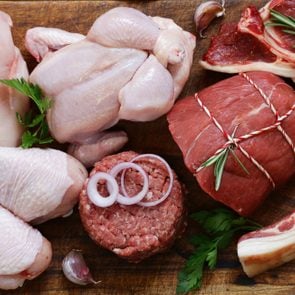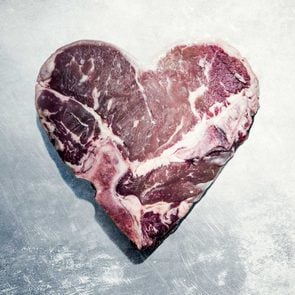Here’s What Happens to Your Skin When You Stop Eating Meat, Say Diet and Dermatology Experts
Updated: Nov. 21, 2022
Plus, dietitians, a dermatologist, and recent science offer a prime list of foods to transform your skin health from the inside out.
What happens to your skin when you stop eating meat?
By now, you’ve probably heard reducing your meat intake can be good for your insides. Turns out, pros say this conscious diet change is also one of the most beautiful things you can do for your skin.
It comes down to two health topics that are getting a lot of buzz (and deservedly so): Inflammation and collagen. As registered dietitian Trista Best, MPH, RD, LD, tells The Healthy @Reader’s Digest, when it comes to your biggest organ (yep, that’s your skin!) both these subjects are important to understand. “Meat can cause inflammation in the body, and this inflammation can stall collagen production,” Best explains. “Collagen is necessary to keep skin’s healthy, vibrant appearance. Without collagen, fine lines and wrinkles can begin appearing.”
There’s another factor that may make meat a drag for your skin: Eating it increases the production of the insulin-like growth factor 1 (IGF-1) hormone, which has been linked with inflammation-related diseases and disorders such as obesity, cardiovascular disease and cancer.
Meat and other animal products are also high in choline, a nutrient that can spike Trimethylamine N-oxide (TMAO) levels in your liver when consumed in excess. TMAO is a harmful molecule that is associated with chronic inflammation, according to a 2020 study published in the peer-reviewed The American Journal of Clinical Nutrition.
Dana Ellis Hunnes, PhD, MPH, RD, explains, “Meat can affect our IGF-1 levels, inflammation, insulin, TMAO and other inflammatory factors. This impacts hormone levels that affect whether or not we will have acne, wrinkles, or other skin issues.”
Get The Healthy @Reader’s Digest newsletter
A dermatologist’s nutrition suggestions for getting radiant skin

Do you need to totally flip the table on meat to see healthier skin? Here’s the deal: Simply going vegan or vegetarian isn’t quite enough to reduce inflammation and improve your skin health. You can eat Oreos all day and technically still be vegan or vegetarian, but that won’t do your skin much good. (For one thing, all that sugar and those artificial ingredients stand a good chance of heightening inflammation, too.)
One major key to fighting inflammation and noticing better skin is to eat whole plant foods like fruits, vegetables, legumes and whole grains. One 2020 study published in the peer-reviewed Journal of Clinical and Aesthetic Dermatology concluded the following: “A WFPB [whole foods, plant-based] diet maximizes the antioxidant potential within our cells by providing essential vitamins, including vitamins A, C, and E. It also helps to eliminate harmful carcinogens and gerontotoxins within our bloodstream and … prevents cellular damage.”
Translation? These researchers say their findings support “a [whole foods, plant-based diet] for preventing skin aging.”
The Best and Worst Diets for Your Cholesterol, Says UCLA Cardiologist
Mary Stephens, MD—a dermatologic surgeon at NYU Langone in New York City—says whole foods and plants nourish the skin from the inside out by fighting free radicals and preventing damage to skin cells. “My biggest recommendation for skin health is to eat a balanced diet rich in antioxidants such as fruits and veggies of all kinds,” Dr. Stephens says.
She lists the following foods as being “especially” beneficial for skin:
- dark, leafy greens
- avocados
- nuts
- fruits and vegetables that are bright in color
- healthy fats
Combine these foods with staying hydrated and eating fewer processed foods, and your skin will flourish.
Here’s How Much Water You Really Need in a Day, with Nutritional Scientists’ Latest Wisdom
Can cutting out meat prevent breakouts (…or, even cause them)?
Like most skin conditions, many acne cases are linked to inflammation in the body. A whole-foods, plant-based diet can be one wise way to manage this—but if you’re going cold turkey on meat for the first time, you probably won’t see improvements overnight.
Dr. Ellis Hunnes says cutting out meat may actually cause acne and other skin problems to worsen at first while your body adjusts to your new way of eating and your hormones begin to self-regulate. The key, she suggests, is to be patient and allow your body a grace period. After a few weeks, it’s likely you’ll begin to observe the payoff for your skin.
Want more skincare love and tips for healthy living? Sign up for The Healthy newsletter and follow us on Facebook and Instagram. Keep reading:
- The 4 Best Vitamin D Supplements Depending on Your Specific Needs, from Registered Dietitians
- Dermatologists Say This 1970s Anti-Aging Ingredient Is Still the Gold Standard for Gorgeous Skin
- The 12 Vitamin K-Richest Foods for Healthy Aging, from a Nutritional Biochemist
- A Psychologist Says This Trending Way to Handle Anger May Actually Be Good for Your Heart




















